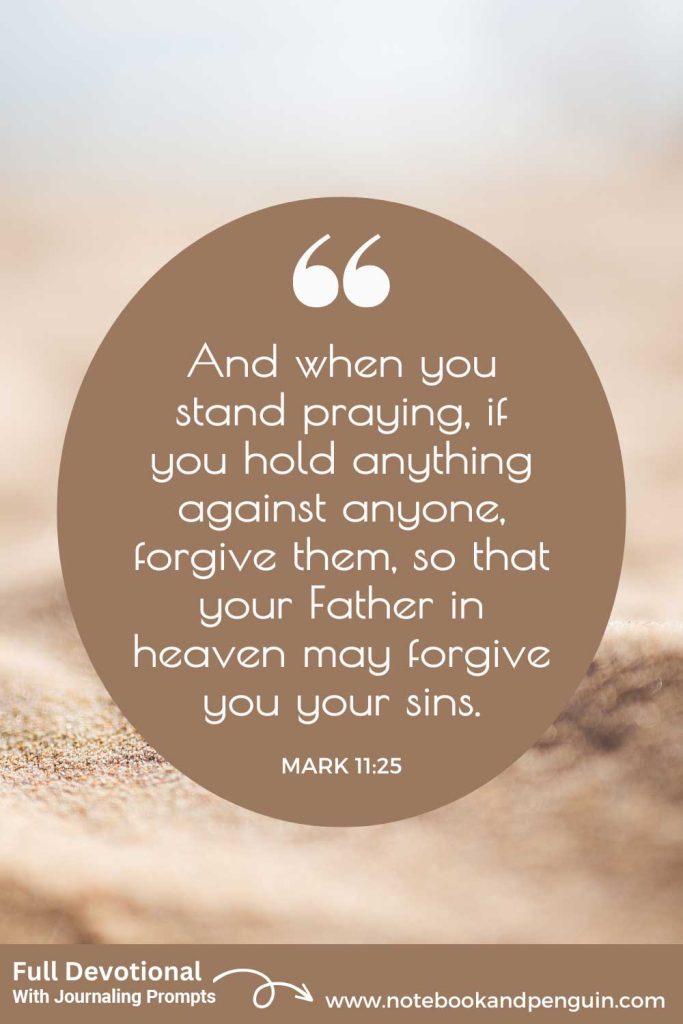Forgiveness And Reconcilliation
Forgiveness is probably one of the most challenging parts of living a Christian life. When someone hurts us, it’s easy to hold on to negative feelings like bitterness, resentment, or anger. But Jesus teaches that unforgiveness can hinder our relationship with God so it is essential to learn to forgive so that we can live at peace with ourselves, with others and most importantly with God.
Mark 11:25 calls us to forgive freely and completely, just as God forgives us. But how do we forgive when the pain is deep? How can we release the past and walk in true freedom?
Scripture: Mark 11:25 (NIV)
“And when you stand praying, if you hold anything against anyone, forgive them, so that your Father in heaven may forgive you your sins.”
Pin Me!

Historical Context of Mark 11:25
This verse comes right after Jesus teaches about faith and prayer (Mark 11:22-24). He explains that faith can move mountains, but He immediately follows this with a command to forgive. Why?
- In Jewish culture, prayer was a central part of daily life, often done while standing in reverence before God.
- However, unforgiveness created a spiritual barrier between people and God.
- The religious leaders of Jesus’ time were often quick to judge but slow to forgive. Jesus challenges this attitude by saying that true faith includes a heart of forgiveness.
This verse teaches us that forgiveness is directly linked to our ability to pray and receive from God.
Breaking Down Mark 11:25
“When you stand praying”
- This suggests a posture of prayer and worship.
- Prayer is meant to be a time of communion with God, but Jesus reminds us that our relationships with others impact our relationship with Him.
“If you hold anything against anyone, forgive them”
- This is a broad and inclusive statement—anything and anyone means there are no exceptions.
- Jesus isn’t asking us to ignore the hurt but to release it to God.
- Forgiveness doesn’t mean excusing the offense, but it does mean choosing freedom over bitterness.
“So that your Father in heaven may forgive you your sins.”
- Jesus connects our forgiveness of others with God’s forgiveness toward us.
- This doesn’t mean we earn God’s forgiveness by forgiving others, but it does mean that an unforgiving heart can block the flow of His grace in our lives.
Practical Applications
1. Examine Your Heart Before You Pray
Before coming to God in prayer, we should reflect on our relationships and ask if there’s any unforgiveness in our hearts.
💡 Practical Step: Before you pray, ask:
“Lord, is there anyone I need to forgive?”
2. Choose to Forgive, Even When It’s Hard
Forgiveness is not a feeling—it’s a decision. Even if you don’t feel ready, you can choose to release the offense to God.
💡 Practical Step: Write down the name of someone you need to forgive and pray:
“Lord, I release this person to You. Help me to forgive them as You have forgiven me.”
3. Remember How Much God Has Forgiven You
We all need God’s grace. When we remember how much we’ve been forgiven, it becomes easier to forgive others.
💡 Practical Step: Read Matthew 18:21-35, the Parable of the Unforgiving Servant, and reflect on God’s mercy in your life.
4. Pray for Those Who Have Hurt You
One of the most powerful ways to heal from hurt is to pray for the person who wronged you.
💡 Practical Step: Each time you feel bitterness rising, pray a blessing over the person who hurt you.
5. Take Steps Toward Reconciliation (If Possible)
Forgiveness doesn’t always mean restoring a relationship, but when possible, we should seek peace and healing.
💡 Practical Step: If appropriate, reach out to someone you’ve had conflict with and take a step toward reconciliation.
Dig Deeper: Journaling Prompts
Forgiveness is not always easy, but it is always freeing. When we choose to release others, we open the door for God’s peace and grace to flow into our lives.
Who in your life do you need to forgive? – Be honest about any lingering resentment or hurt.
How has God shown you forgiveness? – Reflect on times when God extended grace to you.
What fears hold you back from forgiving? – Are you afraid of being hurt again? What does the Bible say about trust and boundaries?
How do you feel when you hold onto unforgiveness? – Describe the weight of bitterness versus the freedom of release.
What steps can you take toward healing? – Write out a plan for moving forward, even if it’s just praying for strength to forgive.
Closing Prayer
“Lord, I surrender my hurt and bitterness to You. Teach me to forgive as You have forgiven me. Help me walk in freedom, love, and grace. Amen.”




